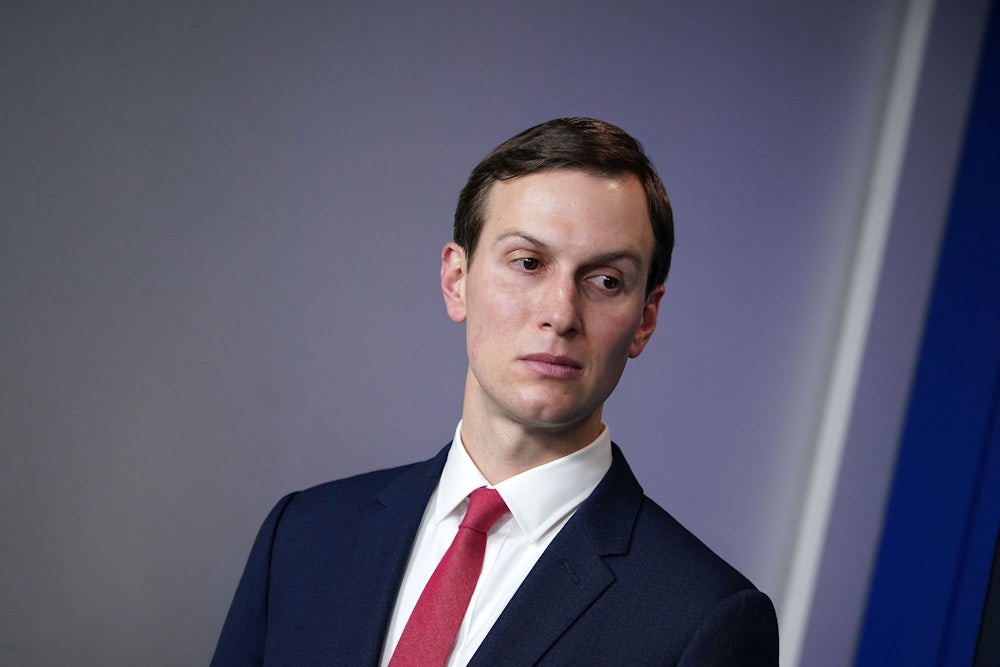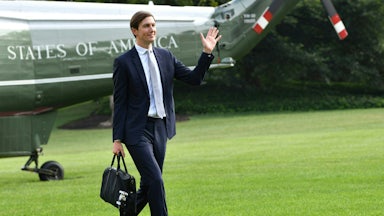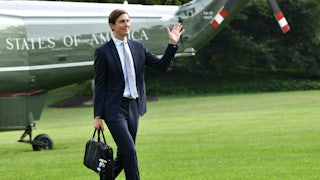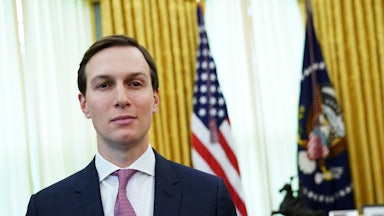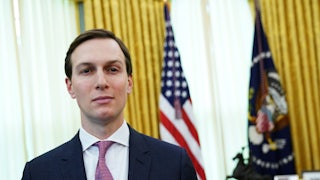The ascension of Donald Trump’s political career over the past decade has had very little upside for the American people. Still, one silver lining that’s stood out as a consequence of his reign has been the ability of he and his family to thrust ongoing concerns about corruption and foreign influence into the center of the national conversation. There was Trump’s reliance on anonymous wealth flooding his real estate empire, which helped propel long-overdue transparency reforms for things like shell companies. There was Trump’s obvious, odious links to those pushing foreign interference operations, breathing new life into things like the moribund Foreign Agents Registration Act.
This pattern hasn’t let up since Trump left office. Rather, these trends have accelerated and begun rippling outward, bringing a spotlight to other kinds of rote corruption that long predated Trump—but which are suddenly caught in the unflattering light of the kliegs whenever his family enters the picture.
The latest incident of the Trump coterie casting new light on previously routine corruption in Washington came earlier this month, courtesy not of Trump himself but of his oleaginous son-in-law. Last week, The New York Times broke the news that Jared Kushner had successfully landed billions in Saudi funding for his new private equity firm. While the deal itself may appear predictable—Kushner is hardly the only Washington insider to be showered in Saudi funding—the details were staggering and point directly to the rot at the heart not only of the broader Trump machine but of the entire edifice of Washington influence-peddling writ large.
As the Times reported, the Saudi sovereign wealth fund agreed to funnel at least $2 billion to Kushner’s new firm, Affinity Partners. In return, the Saudis received not only nearly 40 percent of the firm’s regular management fees, but an additional “stake of at least 28 percent” of Kushner’s firm and recognition as a “cornerstone” investor in this new enterprise.
Those details alone would be enough to flip the deal from seedy to sordid. This is, after all, a regime that not only stands responsible for some of the most heinous crimes on the planet—including things like dismembering journalists and the ongoing carpet-bombing of Yemen—but which has launched one of the most successful whitewash operations in Washington. And now, it’s also one of the primary financial backers of a member of the former president’s inner circle, with a direct line to the leader of the Republican Party.
Yet the stench from Kushner’s deal doesn’t stop there. As The Intercept reported on Monday, the pitch from Kushner’s firm to its Saudi partners was as crooked as they come. Bookended by vapid corporate pablum (Kushner’s firm claimed it is “accelerating transformation through connectivity”), the firm’s pitch centered on Kushner’s former role in Trump’s White House and the kinds of political connections Kushner could offer Saudi partners. Centering on the “network” that Affinity would bring, Kushner’s firm did little more than point to contacts in the Trump orbit as a reason for investment. “They said they’d never seen such a joke of a deck, openly talking about ‘networking’ and ‘networks’—i.e., our corrupt insider contacts,” one source connected to potential fund investors told The Intercept.
Indeed, the pitch itself was so void of content that the Saudi panel screening investments objected to the deal, citing, among other things, the “public relations risks” associated with bankrolling Kushner’s firm. Yet the panel was overruled by the Saudi sovereign wealth fund’s management, which included Mohammed bin Salman, Saudi Arabia’s leader and Kushner’s texting pal.
There’s nothing illegal in Kushner’s actions, per se. But the details of the investment—the players and amounts involved, the lack of any kind of broader financial strategy on Kushner’s firm’s part, all linking Trump’s family and one of the worst regimes extant—are the kinds of egregious violations of public trust in which the Trump family has long traded. Just as foreign governments used anonymous real estate investments to curry favor with the Trump network, they are now turning to Kushner’s private equity firm to bankroll continued access.
The entire deal was egregious enough that Democrats have already begun calling for formal investigations into the affair. As Senator Elizabeth Warren said earlier this week, the Department of Justice “should take a really hard look” at the contours of the deal. She’s not wrong: Kushner’s effectively selling political access, rather than financial acumen, to a foreign dictatorship, all in broad daylight. While no investigation has yet opened, the deal should, at the very least, add momentum to calls for increased anti–money laundering oversight for private equity funds—which have enjoyed a two-decade exemption from even basic due diligence checks on funds.
There is, however, a catch. Kushner’s actions don’t exist in a vacuum. If anything, he’s just following a playbook laid out by other, more subtle influence-peddling operations that came before him—operations that sold political access to the highest bidders, regardless of the source of their wealth. “It’s fun and appropriate to mock Jared, but we shouldn’t lose sight of the real problem: This kind of profiteering by former (and possibly future) officials is seen as totally acceptable in D.C.,” Matt Duss, foreign policy adviser to Senator Bernie Sanders, tweeted. “As usual, the main difference is that the Trump crew is just more shameless about it.”
Kushner may be the most flagrant about these cash-for-influence schemes, but he’s hardly the most prominent. For instance, former Republican presidential nominee Bob Dole—the supposed “lion of the Senate,” who passed late last year—left office only to become one of the most brazen foreign lobbyists in Washington, with clients ranging from foreign dictatorships to now-sanctioned oligarchs. Former President Bill Clinton opted for a slightly different tack, transforming the nominally nonpolitical Clinton Foundation into a sieve for dictatorial and oligarchic money—including, wouldn’t you know it, millions from Saudi Arabia.
On and on and on, the pattern is the same. The only thing more American than hot dogs and apple pie is, apparently, leaving office to gorge on foreign financing in the service of influence-peddling. Kushner and the rest of the Trump clan may be the most barefaced thus far. But they’re simply holding a mirror up to a decades-old practice—one that, ironically enough, helped give rise to Trump in the first place and helped his family now profit from all of the dictatorships lusting for a chance to bankroll the most rotten family in America.
